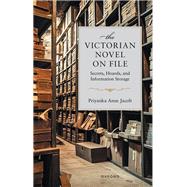
The Victorian Novel On File Secrets, Hoards, and Information Storage
by Jacob, Priyanka AnneBuy New
Rent Textbook
Rent Digital
Used Textbook
We're Sorry
Sold Out
How Marketplace Works:
- This item is offered by an independent seller and not shipped from our warehouse
- Item details like edition and cover design may differ from our description; see seller's comments before ordering.
- Sellers much confirm and ship within two business days; otherwise, the order will be cancelled and refunded.
- Marketplace purchases cannot be returned to eCampus.com. Contact the seller directly for inquiries; if no response within two days, contact customer service.
- Additional shipping costs apply to Marketplace purchases. Review shipping costs at checkout.
Summary
Author Biography
Priyanka Anne Jacob is Assistant Professor of English at Loyola University Chicago. She writes about the form of the novel, as inflected through Victorian information and material cultures. Other research interests include: temporality, narrative, detective fiction, epistolarity, empire, and race and gender studies. She has published scholarly articles, one on sensation fiction in Victorian Studies, which received the honorable mention for the 2020 Donald Gray Prize, and one on George Eliot in Victorian Literature and Culture. She has also contributed teaching materials to the website Undisciplining the Victorian Classroom. She earned her doctorate at Princeton University and previously taught at the College of Wooster.
Table of Contents
An electronic version of this book is available through VitalSource.
This book is viewable on PC, Mac, iPhone, iPad, iPod Touch, and most smartphones.
By purchasing, you will be able to view this book online, as well as download it, for the chosen number of days.
Digital License
You are licensing a digital product for a set duration. Durations are set forth in the product description, with "Lifetime" typically meaning five (5) years of online access and permanent download to a supported device. All licenses are non-transferable.
More details can be found here.
A downloadable version of this book is available through the eCampus Reader or compatible Adobe readers.
Applications are available on iOS, Android, PC, Mac, and Windows Mobile platforms.
Please view the compatibility matrix prior to purchase.
